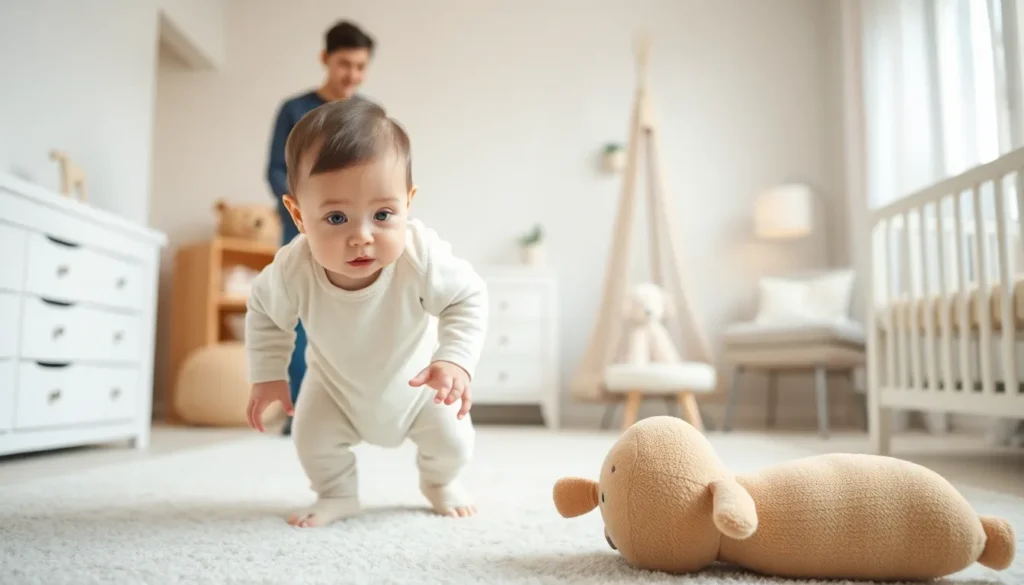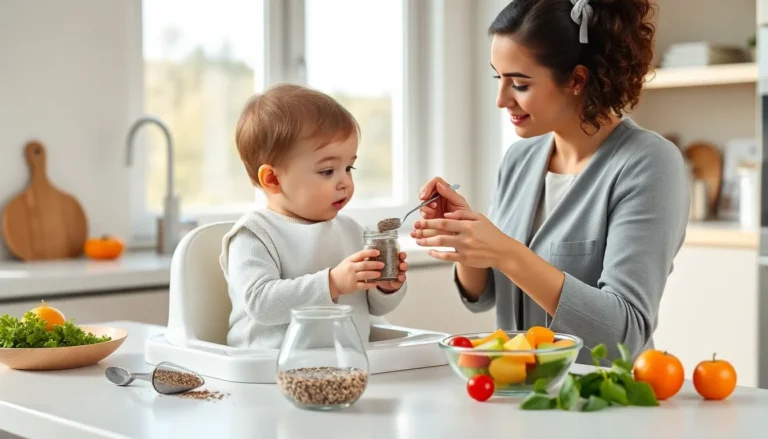Table of Contents
ToggleEvery parent has felt that gut-wrenching moment when their little darling bonks their head. Whether it’s during a tantrum or a wild play session, babies can certainly pack a wallop. But why do they do this? Is it a call for attention or a rite of passage into toddler-hood? Buckle up as we jump into the quirky world of baby behavior and uncover the reasons behind their head hitting antics. Spoiler alert: it’s not as alarming as it seems.
Understanding Head Hitting in Infants

Head hitting in infants can often leave parents puzzled and a bit anxious. It’s essential to understand that babies are in a phase of exploration. They’re like tiny scientists experimenting with the world around them, pushing the boundaries of what feels right. Babies have a unique way of communicating, and head hitting is just one of the many methods they use to express emotions. Whether they are seeking attention, expressing frustration, or simply letting off steam, this behavior can be normal. Research indicates that infants’ neurological and emotional developments can lead to these rather fascinating yet concerning actions.
Common Reasons Babies Hit Their Heads
There are several reasons babies may engage in head hitting. Attention Seeking: Sometimes, a baby wants to elicit a response, whether it’s an amused giggle or a look of concern from mom or dad. Frustration: When a toy just won’t cooperate or a snack seems just out of reach, head hitting might emerge as an outlet for that frustration. Self-Soothing: Interestingly, some babies hit their heads as a means of self-soothing. This rhythmic action can be calming and help them manage their emotions. Sensory Exploration: Babies are naturally curious and use their bodies to explore sensations. The feeling of a thud, accompanied by sound or vibration, may intrigue them.
Developmental Milestones and Head Hitting
As babies grow, they reach various developmental milestones that can affect their actions, including head hitting. Physical Development: With gross motor skills developing, babies learn how to move their bodies. This newfound ability can come with a few accidents, leading to moments of head hitting during playtime. Emotional Development: As they start to express emotions, they may lack the vocabulary to verbalize their feelings. Babies often resort to physical expressions like hitting their heads when frustrated or overloaded. Cognitive Growth: With cognitive skills in the works, some actions might stem from simple curiosity about cause and effect. What happens if I hit my head? This simple inquiry can lead them down quirky paths.
When to Be Concerned About Head Hitting
While some head hitting is typical behavior during development, there are cases when it’s worth keeping an eye on. Signs to watch for include: Frequency: If it occurs excessively or becomes a regular part of their routine, it might be helpful to consult a pediatrician. Severity: If the hits seem particularly hard and result in bruising or other injuries, intervention is necessary. Behavior Changes: If hitting is accompanied by other concerning behaviors, such as excessive crying, withdrawal, or developmental regression, these are serious red flags.
Parental Response to Head Hitting
How parents respond to head hitting can significantly impact a baby’s sense of security and emotional development. Keeping a cool demeanor is crucial. Avoid showing alarm if your baby hits their head. Instead, calmly redirect their attention to a different activity. It’s vital to validate their feelings by acknowledging frustrations or distress without reinforcing the hitting behavior. Consistency in responses helps establish boundaries while allowing babies to express emotions in healthier, safer ways.
Preventive Measures for Head Hitting
Preventing head hitting involves creating a safe and welcoming environment that encourages exploration. Safety First: Ensure all play areas are padded or free of sharp objects to reduce the risk of injury. Creating a secure space allows babies to explore freely without the fear of harm. Healthy Outlets: Introduce alternative coping strategies. Soft toys provide great alternatives for babies to express frustration without the risk of injury. Attentive Interaction: Engaging with your infant consistently can drastically decrease attention-seeking head hitting. Responsive parenting encourages secure attachments, reducing the need for babies to hit their heads for attention.






